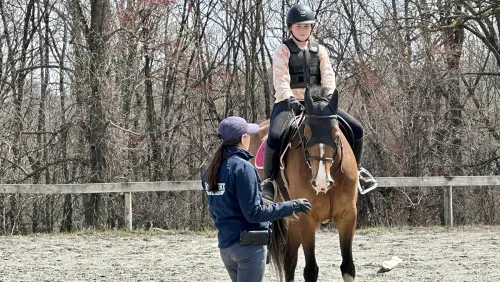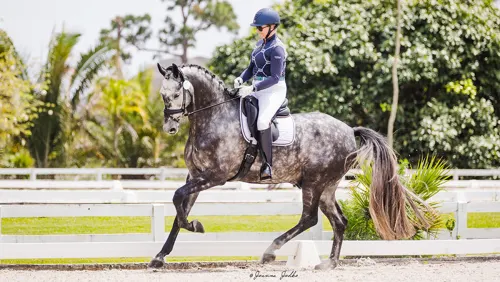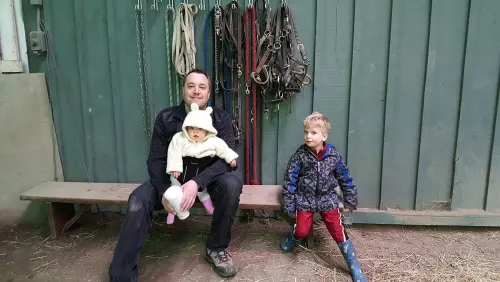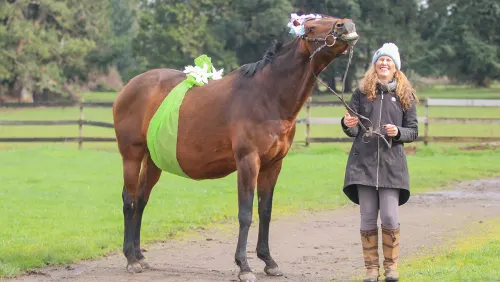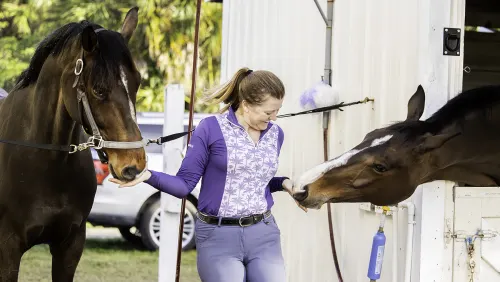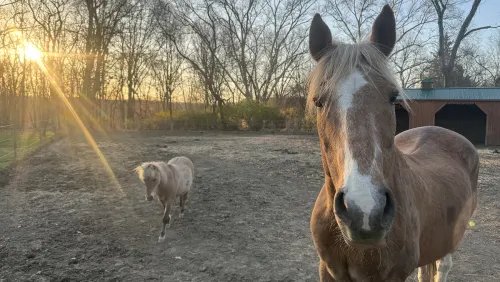As an amateur rider with a terrible mental game—just ask any poor friend who’s had to help me get ready for cross-country—I jumped at the chance to attend a sports psychology workshop with Kip Rosenthal at Virginia Intermont College, Oct. 25-26.
The mental game is obviously one crucial aspect of competition, and it’s one I think many people neglect entirely or have a difficult time mastering. Almost everyone takes lessons in jumping or flatwork, but studying the art of staying calm and focused? Not so common.
Rosenthal holds a Ph.D. in clinical counseling psychology from Fordham University (N.Y.), but she also had a serious competition career of her own—placing in the top three at both the AHSA Medal Finals and ASPCA Maclay Finals. Now Rosenthal spends most of her days coaching riders at her Benchmark Farm in New York, judging and giving sports psychology workshops, which, along with her educational credentials, seemed like the perfect combination of skills to help me learn to keep my head on straight in the ring.
And I was right! Through the two days of workshops, Rosenthal talked us through the many mental traps riders fall into, and strategies for avoiding those pitfalls. I’ve compiled the tips that I found the most useful for my own riding below, and hopefully they’ll help you, too. Feel free to add your own in the comments section.
1. Mistakes Are Good. This is a tough concept for me to grasp, and I imagine it is for most riders. After all, we’re trying to do our best in competition or in schooling, and mistakes don’t seem like part of that winning equation. But Rosenthal was quick to remind us that without mistakes, there is no learning.
Ever had one of those lessons where your horse goes perfectly through all the exercises? I’ve had one or two, and I left those lessons feeling pretty good about myself, but the lessons I remember more—the ones where I had real breakthroughs—always came on days when my horse and I couldn’t seem to do anything right.
“If you’re not making any mistakes, you’re not going to have any new information to put in your tool bag,” said Rosenthal. “Winners are not afraid to take risks. If you’re so fearful of making a mistake, you’re never going to succeed. The worst thing that could happen in a lesson is that nothing goes wrong, and everything is perfect.”
2. Excellence Is Attainable, But Perfection Is Not.
I’ve often heard the phrase, “Practice makes perfect.” Then there’s the saying, “Practice does not make perfect. Only perfect practice makes perfect.” But Rosenthal recommended eliminating the word “perfect” from your mind entirely and focusing on more attainable, concrete goals—both long- and short-term.
“Instead of trying to strive to be perfect, because you won’t be, strive for excellence,” said Rosenthal. “Excellence is attainable, but perfection is not. What I like to do is focus on the process, so you have this longer-term goal and shorter-term goals along the way. If you’re interested in the process of learning, it makes the journey so much more pleasant.”
3. See Yourself As A Winner.
ADVERTISEMENT
“Negative thoughts lead to negative emotions, and they take us away from the present,” said Rosenthal. “Then you can make small errors, which lead to bigger errors. You should program your internal dialogue with positive statements. If you find yourself, especially in sports, constantly looking back on what wasn’t good, it’s not going to re-affirm you or give you confidence that you’re going to make it better. Keep a balance between what’s good and what needs improvement, knowing we can always improve and always learn. When you hear yourself going to the direction of what you don’t want to be telling yourself, have the ability to tell yourself, ‘Stop.’ ”
4. Find The Right Tension Level.
Rosenthal explained that some riders thrive at a horse show when they get ready with friends or family around, in a high-energy environment, but other riders do better if they can take a few minutes to be alone and focus on the task at hand. Either one is fine, but it’s important to know into which category you fall.
5. Never Go Off Course Again.
The fear of going off course, and of the elimination that would ensue, haunts my dreams. There’s nothing worse than that paralyzing feeling when you realize you have no idea which fence should come after the red-and-white oxer you just jumped. Never fear: Rosenthal had a tip for that problem, too.
“I have students go down to the ring with a piece of paper and mark down the course,” she said. “Not just 1, 2, 3, but I have the student write down exactly what each jump was—a white gate with black and white poles on top, for instance—and add in arrows, and then while the rider is at the ring, I tell them to turn their backs to ring, hold the paper up and study it. Then take paper, put it in your pocket and go back to barn. You can take out the paper and look at it again.”
6. Block Out Any Outside Distractions.
Having focus problems? Finding that your mind begins to wander after fence 2 on course, or that the barking dog standing by the ring distracts you from your tasks?
Rosenthal recommended a simple mental exercise to help riders develop the right kind of focus. First, find a goldfish (an actual fish, not a snack cracker), a lava lamp or a computer with an animated screensaver. Sit somewhere quiet, where there aren’t any distractions, and then stare at the focus object for 10 seconds. The next time, stare at the object for 20 seconds, then 30 seconds and then 40 seconds. Build up by 10-second increments, until you’re able to stare at the object for two minutes without losing focus. Then, take the fish/computer/lava lamp into an area with more distractions (for example: the kitchen while someone else is making dinner or near someone talking on the phone) and repeat the exercise. This kind of concentrated focus will help you stay “in the zone” while doing a course or test.
7. Name Your Butterflies.
“If you get nervous, that’s an emotion,” said Rosenthal. “Emotions have tremendous energy. When you try not to feel something, it’s going to pound on you, and you are going to feel it even more. Rather than letting emotions take control of you, train yourself to take control of the emotion.”
ADVERTISEMENT
Sounds easy enough, right? Except all riders know it’s not actually easy. However, Rosenthal had a great tip for helping reign in those unwanted feelings.
“When you start to feel ‘butterflies’ in your stomach, that’s your endorphin system starting to click into gear,” she said. “Before it starts to happen, you’re going to see three butterflies in your head, and you’re going to give them names. As you walk to the ring, and you start to feel that emotion, you’re going to say, ‘Come on, butterflies. Get on my shoulder, and let’s go down to the ring together.’ It might make you laugh, talking to invisible butterflies, and laughing takes away toxicity from the other emotion.
“But,” Rosenthal added, “you might want to talk to your butterflies quietly.”
8. Trust Your Plan.
This one was probably my favorite tip. So often I make a plan about how my round or test should go, and then once I get in the ring, I get nervous and abandon that plan in favor of…kicking madly at the fences and praying we get there correctly. Obviously not effective! But, as Rosenthal explained, “An amateur is surprised when a plan works; a professional is surprised when it doesn’t.”
With the help of a trainer, you can develop a solid plan, and then you can start to trust that it’ll get through a sticky spot you might encounter during a competition.
Lisa Slade explored this topic more in her article “Battling The Butterflies,” which appeared in the Dec. 3, 2012 issue of the print magazine (subscribe here for this article and more like it). An excerpt… “You’re waiting by the in-gate when your heart starts racing. All of a sudden your palms are sweating, you feel sick, and your mind goes blank—except for a mental video loop showing you crashing through the first oxer on course. Then you’re ushered into the ring, and you pick up a canter only to realize you have no idea what comes after fence 1. You feel disconnected from your body, and your horse, which usually jumps just fine, is suddenly snorting at trolls in the judge’s stand.
When performance anxiety strikes, competent riders may become frozen passengers. Almost everyone takes lessons in jumping or flatwork, but studying the art of staying calm and focused? It’s not so common. You can learn to battle the nerves that can accompany competition, but it’s a skill that requires practice, just like the rest of your riding.”







